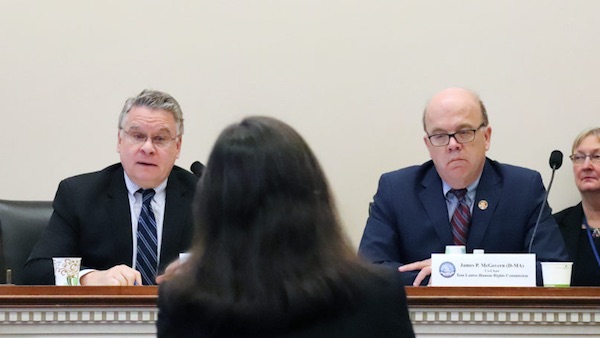
With evidence piling up of systematic collusion by the British Crown Forces in the murders of more than a thousand innocent Irish civilians, US political leaders have vowed to help stop London passing a blanket amnesty.
US Congressman Chris Smith (pictured, left) has said the planned legislative immunity for Britain’s war criminals was in breach of international human rights conventions. He said it was a law that you would find in a “rogue state”.
“This is not a done deal... this can be checkmated before it goes any further,” he said.
He was speaking at the US Congress’s Tom Lantos Human Rights Commission, whose stated mission is to promote and defend internationally recognised human rights norms in a nonpartisan manner.
Mark Thompson, chief executive of victims support group Relatives for Justice, told the hearing that 1,700 families would be denied the truth if the British government’s plan for a statute of limitations on investigations went ahead.
Also speaking to the commission, former English police chief Jon Boutcher revealed his investigation into the actions of MI5’s double-agents and spies had now extended to 250 killings. He said that he had uncovered information never seen by previous investigations, such as the previously suppressed Stevens, Stalker and Sampson reports.
Boutcher said he believed the British government was at “a tipping point” in relation to its amnesty legislation, and urged them to think again as families deserved the truth.
“If the truth is denied, the next generation will carry on the fight for answers and the past will not heal,” he said.
Smith’s co-chair, the Democrat Jim McGovern (pictured, right), has described the proposed amnesty as “far more sweeping” than that enacted by the late Chilean dictator Augusto Pinochet in 1978.
He said he hoped the Tory government would “step back” from the legacy legislation.
“Now is not the time to give up on accountability for the terrible human rights abuses committed during the Troubles,” he said.
Congressman Smith aded: “There is no peace when there is no investigation and absolutely no closure.”
The Police Ombudsman, who has been investigating loyalist killings, confirmed last week she had found a pattern of “systemic collusive behaviours” by the RUC (now PSNI) police.
The report of Ombudsman Marie Anderson on collusion in south Belfast in the 1990s was the second substantial report on collusion to be published within three weeks. It documented RUC collusion in the murder of 11 innocent nationalists in south Belfast, including the victims of the Sean Graham’s massacre.
The collusion was so serious and so widespread “that if it wasn’t known by the senior officers who led the RUC at the time it should have been known,” she said.
However, the identity of the killer agents referred to in the report, and in some cases the gangs they were affiliated with, remain a secret. The Ombudsman has also refused to reveal how many of the eight informers identified by her office remain in the pay of the British state.
A carefully worded apology by the PSNI over the killings failed to impress victim’s groups, including Raymond McCord, whose son was killed by loyalist gangs operating in collusion with the force in 1997.
“Why has no one been charged?,” he asked.
He condemned unionist politicians for failing to support an independent inquiry or to call a debate in Westminster.
“Is it because their loyalty to the state is so blind to justice, or the fact it is Catholics that are dead?
“As a member of the Unionist community, I fully support the Sean Graham’s bookies massacre victims’ families and it is way past the time when unionist politicians did the same. They disgrace us.”
![[Irish Republican News]](https://republican-news.org/graphics/title_gifs/rn.gif)
![[Irish Republican News]](https://republican-news.org/graphics/title_gifs/harp.gif)

